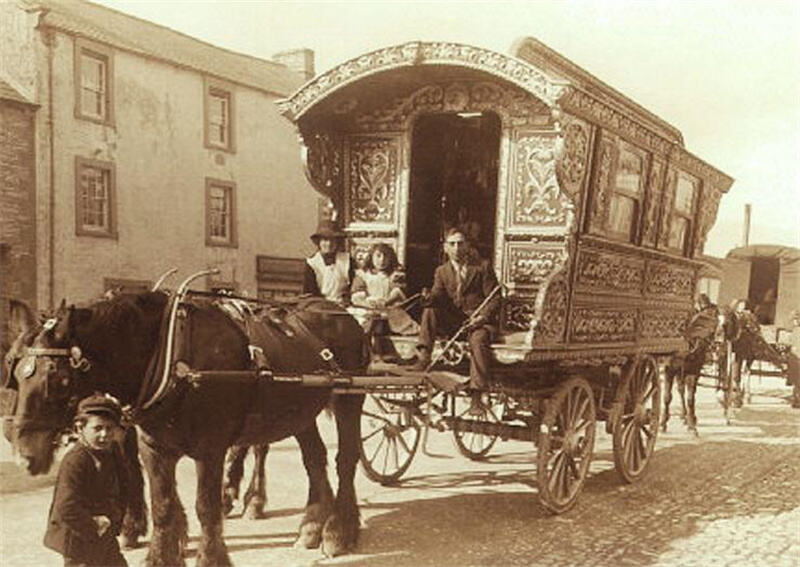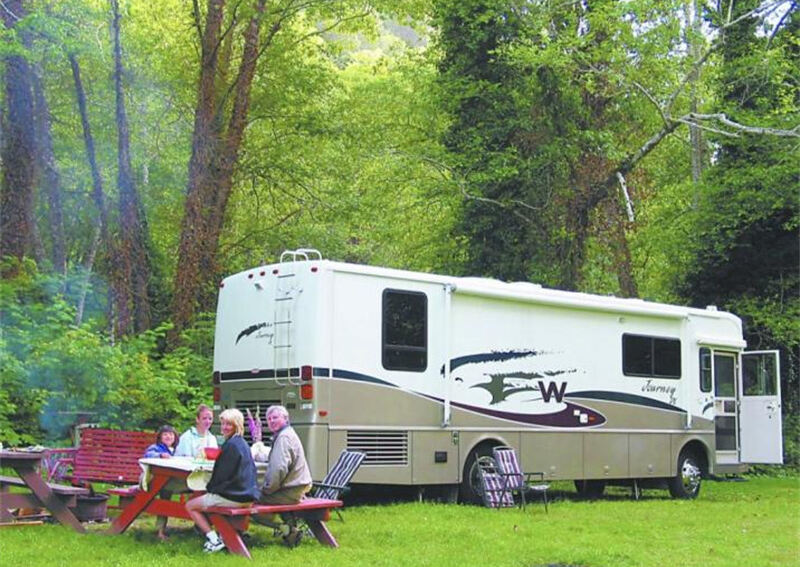The origin of the RV and to the world
RV originated from the European horse and cart, and was popularized by the United States in the 20th century. After the war, it was popularized in Europe and the United States. Nowadays, it integrates science and technology with environmental protection, and develops diversified RV culture all over the world.
RV culture in different countries
Nowadays, RVs is not only a kind of transportation, but also a kind of life attitude - freedom, the pursuit of nature, and the feeling of walking on the road. However, the cultural backgrounds of different countries give caravanning life its own look:
·In the United States 
RVs are mostly used for family vacations, which is the intersection of free spirit, highway culture and affection;
·In Canada 
everyone pays more attention to connecting with nature, and caravans are often driven into the forests and national parks;
·In Australia 
caravanning is often a long-distance or even permanent lifestyle;
·In New Zealand 
where free camping is very prevalent, the In New Zealand, free camping is very popular and caravanning is almost standard for visiting tourists;
·In Europe 
there is a strong sense of environmental protection and a preference for compact trailers, which are better suited to traveling through small towns and the countryside;
·In China 
the caravanning culture is on the rise, and is especially welcomed by young people and families, who are more inclined to the “light luxury and comfortable” camping experience.
Whether in the vast American highway, quiet New Zealand mountains, or the rising Chinese campground culture, the RV carries people's aspirations for life - to carry their daily life in their bags, and to treat the world as their home.
The global RV market distribution is as follows
1. Comparison of mainstream market types
| Country/Region | Mainstream RV Types | Key Drivers | Representative Brands |
| United States | E-Class C motorhome,Luxury Type A Caravans | Family camping culture, mature national park infrastructure | Thor Industries,Airstream |
| Europe | Popup Camper Caravan,Solar-Powered Class B RVs | Narrow urban roads, Eco-policies promoting lightweight designs | Hymer,Dethleffs |
| Australia | All-Terrain Off-Road RVs (6×6 chassis) | Extreme terrain needs, mining industry development | Bruder,Track Trailer |
| Japan | Hydrogen Fuel Cell Campervans | Road width and height restrictions, national hydrogen energy strategy | Toyota,Nissan |
| China | Smart-Connected Class C Motorhomes,Dual-Purpose Class B (Commercial/Travel) | New infrastructure investment, the rise of young groups, shared rental model | Yutong, SAIC Maxus |
| Middle East | Luxury Park Model(Double-layer caravan) | High-end tourism customization, desert starry sky observation needs | Desert Dream Villa |
2. RV sales data
| Country/Region | 2023 Sales (Units) | 2024 Forecast (Units) | 2025 Forecast (Units) | 2023 Market Share |
| North America | 530,000 | 550,000 | 580,000 | 57% |
| Europe | 270,000 | 290,000 | 320,000 | 29% |
| China | 28,000 | 35,000 | 45,000 | 3% |
| Australia | 60,000 | 63,000 | 68,000 | 6% |
| Japan | 22,000 | 23,000 | 24,000 | 2% |
| Others | 30,000 | 32,000 | 35,000 | 3% |
3. RV awnings are essential accessories for RVs. The main brands are as follows.
| Brand | 2023-2024 Global Share | Technical Characteristics | Core Markets |
| Lippert | 32% | Motorized,extension up to 6 m | North America, Europe |
| Carefree of | 24% | Aluminum-magnesium alloy frame, high cost performance | North America, Australia |
| Thule | 18% | Lightweight design, quick installation | Europe, Asia Pacific |
| Awnlux | 15% | Lightweight design, solar awning | Asia, Europe, United States |
| Fiamma | 10% | Lightweight design, aesthetic and durable | Europe, Japan |
Conclusion
The largest market for RVs: North America (57%), followed by Europe (29%),
Awning brand market overview: Dometic, Carefree and Thule are the top three brands, while Awnlux is rapidly capturing market share through its innovative solar awning series and 60% lower production costs compared to European counterparts. Solar awnings with integrated flexible solar film may become the mainstream.
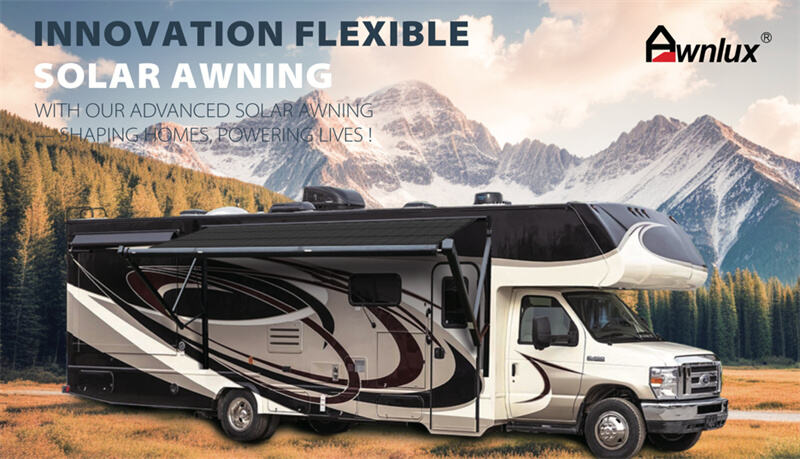
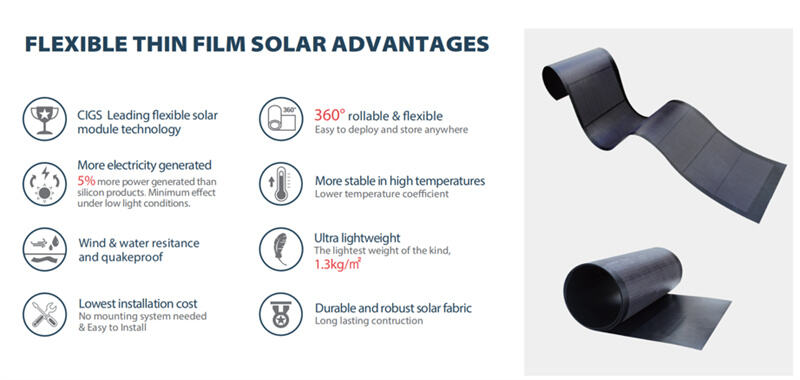
Development Drivers, Challenges, and Future Trends of RV Awnings
I. Development Drivers
1. The "RV + Camping" trend boosts market demand.
In recent years, the lifestyle of camping and RV travel has become increasingly popular. Users are paying more attention to the utilization of outdoor space. As an important accessory for expanding space, the market demand for sunshades has been continuously rising.
2. User experience enhancement drives product upgrades.
Today's consumers keep an eyes on the comfort of outdoor living and have higher requirements for functions such as sun protection, rain protection, and UV protection. This has driven the continuous evolution of products towards intelligence, electrification, and multi-functionality.
3. The integration of technology and green energy.
New technologies such as remote control, electric telescopes, and enhanced wind-resistant structures are becoming increasingly mature. At the same time, under the impetus of the green travel concept, solar systems are rapidly integrating with sunshades, providing new environmentally friendly and energy-saving solutions for RV journeys.
II. Main Problems Currently Faced
1. The diversity of vehicle models is high, but their universality still requires improvement
There are numerous types of recreational vehicles on the market. Awnings need to be customized according to the structure and size of different vehicle models. Standardization and compatibility still need to be enhanced, which affects the efficiency of large-scale production.
2. The complex weather conditions impose higher requirements on the material properties.
In climates with strong winds and sand, heavy rain and snow, and intense ultraviolet radiation, awnings must have higher strength and durability to meet the requirements of long-term outdoor use.
3. The cost threshold for high-end products is relatively high.
New types of sunshades with electric or solar functions have complex technologies and high manufacturing costs. This may limit the purchase intention of users with limited budgets to some extent.
III. Outlook on Future Development Trends
1. Smart sensing functions will become standard features.
Future sunshades will be equipped with environmental sensors that can automatically retract or extend based on changes in the weather. For instance, they will automatically retract when it's windy or rainy and extend when the temperature rises, enhancing convenience and safety.
2. Solar integration may soon become the new standard.
Shading systems will gradually take on the role of energy supply. By integrating solar power generation components into shading fabrics, and achieving integration of shading and power supply, it has become an important development direction in the industry.
Awnlux is at the forefront of global solar shading canopy technology and has pioneered the following star product series: Solar Manual Roll-out Awning: SA5600 and Solar Power Roll-out Awning series SA5700 and SA5710. The solar series of Awnlux not only meets the shading needs but also initiates a new model of "shading while powering" for RVs, at the forefront of global innovation in RV new energy sunshade systems."
SOLAR MOTORIZE BOX AWNING SA5900
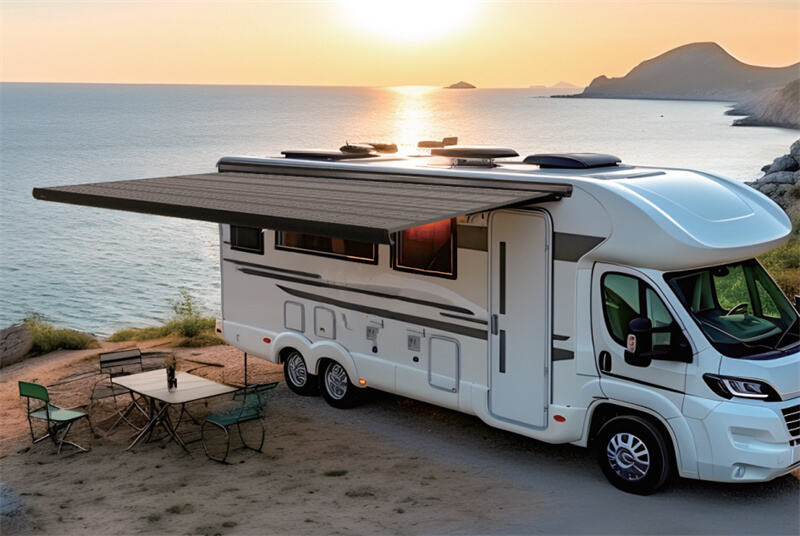
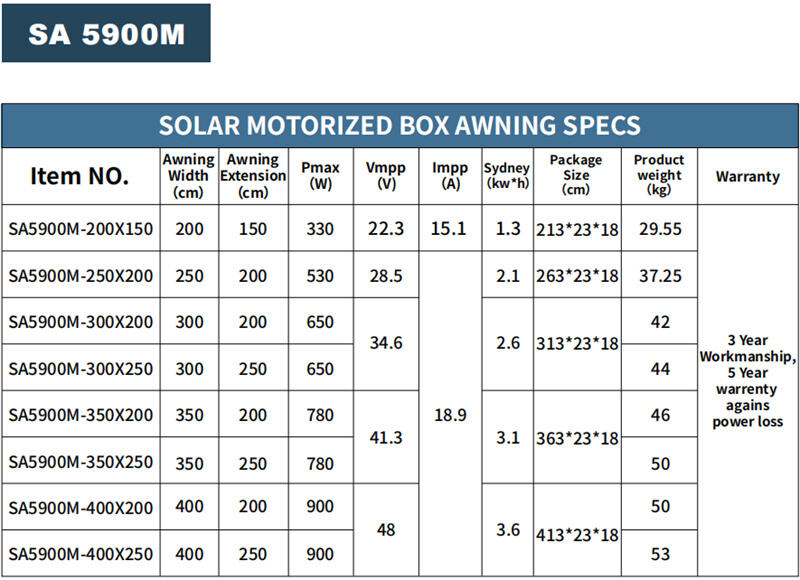
SOLAR MANUAL ROLL OUT AWNING SA5600
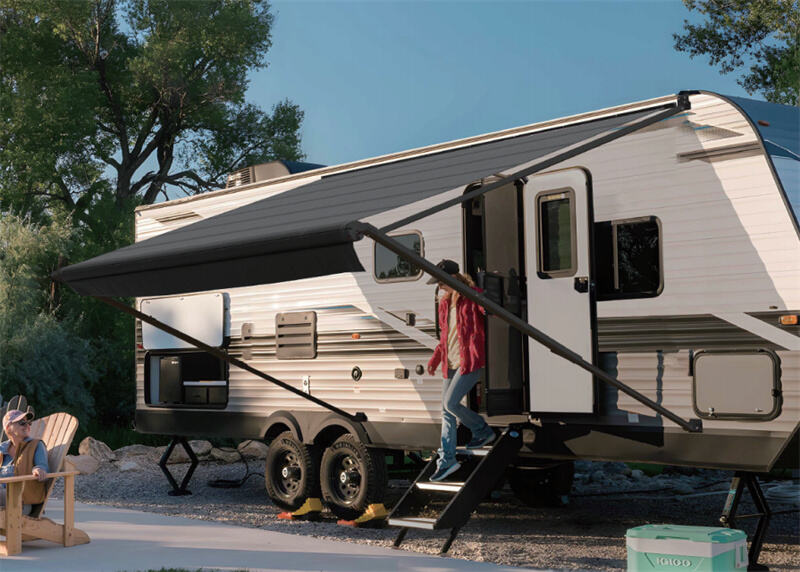
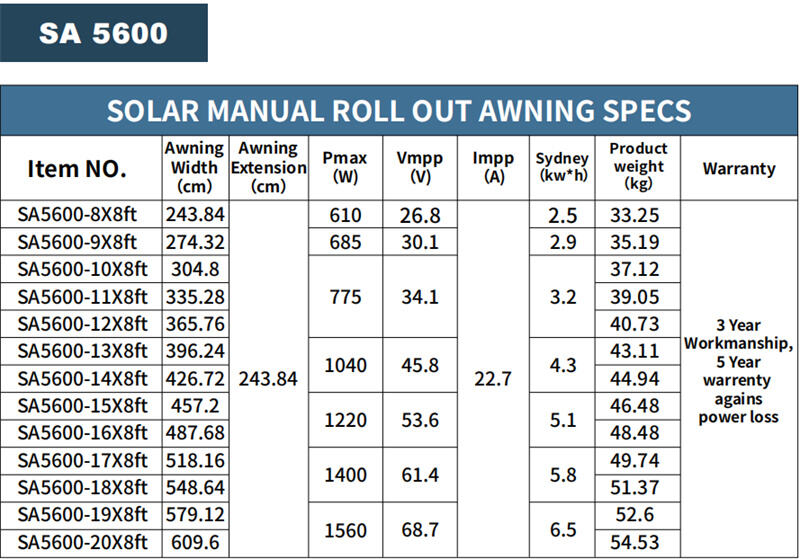
SOLAR POWER ROLL OUT AWNING (STANDARD)SA5700
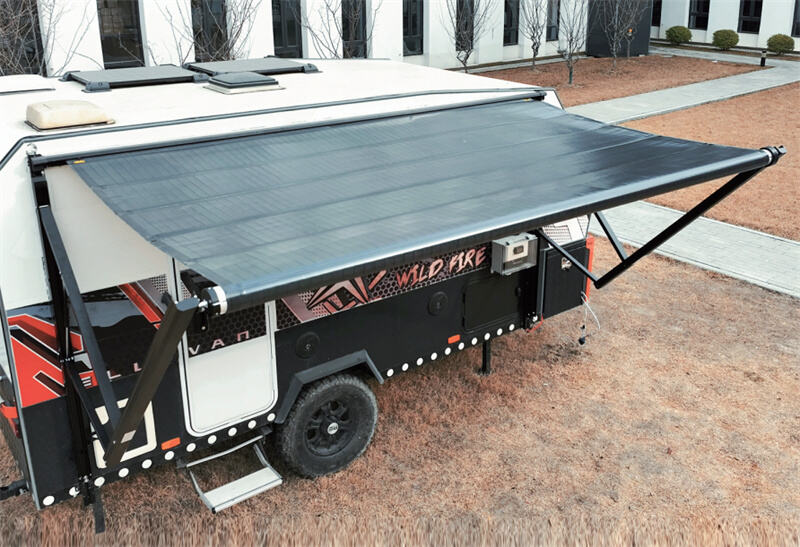
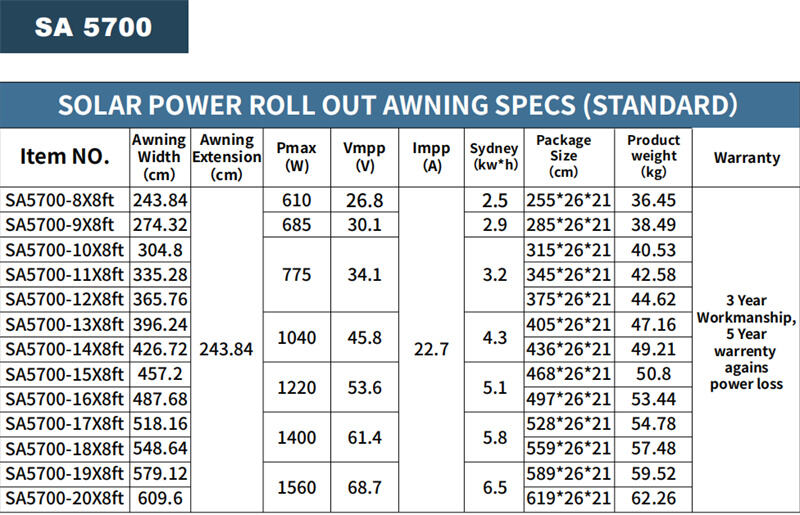
2. Comprehensive Upgrade of Materials and Accessories
The new generation of sunshades will adopt lightweight and high-strength composite materials in terms of materials, and adopt a modular design for quick installation and maintenance. By matching detachable side curtains, projection screens and other expansion components, it can meet users' leisure and entertainment needs in different environments.
Conclusion: The awning for recreational vehicles is currently in a critical transition period from traditional functions to a fusion of "intelligentization + energy". Awnlux is leading this change by launching a full range of products from basic models to solar energy storage models, expanding the boundaries of RV life. In the future, awnings will not only provide shade but also serve as an important carrier for continuously empowering green travel.

 EN
EN
 AR
AR HR
HR CS
CS NL
NL FI
FI FR
FR DE
DE EL
EL HI
HI IT
IT JA
JA KO
KO NO
NO PL
PL PT
PT RO
RO RU
RU ES
ES SV
SV TL
TL ID
ID SR
SR SL
SL UK
UK VI
VI SQ
SQ HU
HU MT
MT TH
TH TR
TR MS
MS AZ
AZ KA
KA LO
LO MN
MN MY
MY KK
KK KY
KY
